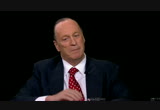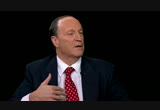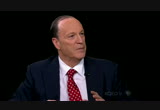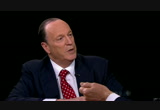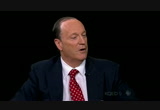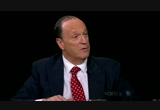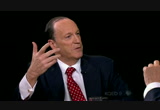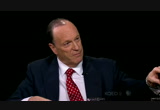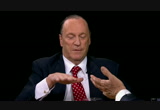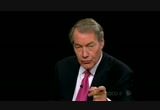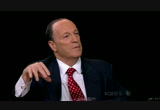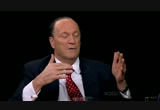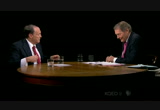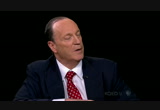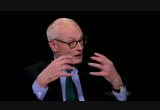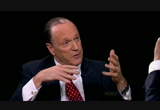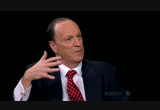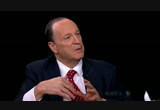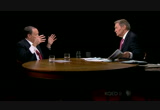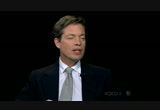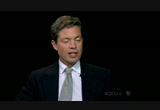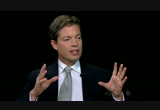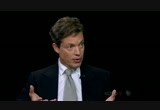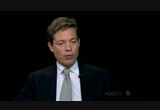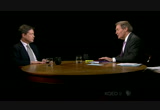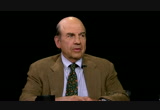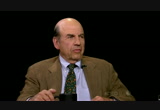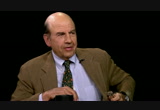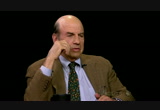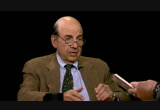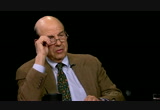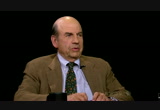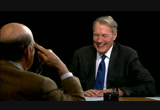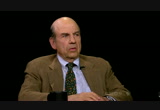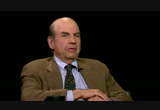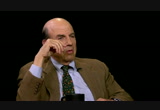tv Charlie Rose PBS February 22, 2013 12:00am-1:00am PST
12:00 am
you know, we've had years of debate about who should pay for health care. how should we do insurance, and who should pay the bills. but i've never seen anyone stop to say hey, wait a minute, how come if will cost you 20 or 25,000 dollars if god-- as you're walking ot of this building, you slip-and-fall and land on your elbow. why will it cost a million dollars if are you diagnosed with cancer, how come, who's getting the money. >> rose: you, because of all your interest from the law to politics to education. >> right. >> rose: come to this subject? i mean did you begin reading or did-- call you up and say we need a good piece on medical care costs. >> i just like to pick topics. i like to pick topics that i don't necessarily know anything about but i think i can learn about. and everybody cares about health care and everybody is affected by bills. and it just struck me that i had never really read anything that said okay, here's why it costs this
12:01 am
much. whose's making the money. ges making money on the cat scans, the hospital c.e.o. it turns out is making 2 or 3, or $4 million. that is the stuff i started to find out. >> rose: you did what any good reporter does, go to the original source. >> i just got bills am everybody said first you will never get bills because there are proif see issues. i said well i will promise the patients privacy but some of these patients will be so angry they will beg me to put their names in, which is what happened. and then came the really hard part. the bills if you have ever looked at a hospital bill and you may not have because you have good insurance, the bills are indecipherable. they are in like double code. and no consumer can understand those bills. they're acronyms, numerical codes and line by line i just decoded them. and figured out what they cost. for example, if one of the patients is getting a cancer drug from memorial sloan-kettering, i figured out how much it cost the
12:02 am
hospital to buy that drug. the hospital was selling it to the patient for x thousand t cost the hospital one fourth or one-third of that. and how much did it cost the drug company to produce the drug. well, the drug companies like to brag to their investors about, you know, their high gross profit margins, which is great stuff if you are talking investors. not great stuff if it's going to be in an article in "time" magazine about how come this cancer drug is costing so much money. >> rose: just want to quote from you. we already covered this point. you say when we debate health care policy in america we seem to jump right to the issue of who should pay the bills, blowing past what should be the first question. why exactly are the bills so high. >> exactly. and if you compare us to other countries, we spend the price for prescription drugs in the united states is 50% higher. as a general matter we spend much, much, much, much, more per capita for health care than any developed country.
12:03 am
that's the bad news. the worst news is our results are terrible. in that sense-- . >> rose: so we're paying more and getting less. >> in that sense it is a bit like the book i wrote about education. which is we spend more on education, the as a results are not as good. here we spend much, much more on health care and the results-- are not good. >> rose: tell me about this concept of charge masters. >> this is the thing, you know, among the categories of things that affect all of our lives that we never knew about, this would be high on the list. every hospital has this giant list, six, seven, 8,000 items called the charge master. again it's all sort of in code and acronyms but if a nurse gives you a cup to take a pill, the cup is listed in the charge master. the cup, the little paper cup might be $6 it if you get a chest x-ray that something else in the charge master. every hospital's charge master is different. none of them are consistent.
12:04 am
none of them make any sense and most of all, there isn't a single hospital administrator who can explain how the charge master prices came to be. and none of them want to talk about it. >> rose: you have expressed this notion too that-- power is buyers in a seller's market where the only sure thing is the profit of the seller. >> exactly. that is why you can have a charge master. you are wearing a really nice tie. >> rose: yeah. >> so if you walked into a tie store and said how much is that tie, the first thing that would be different from the medical marketplace is you would get to know how much the tie is before you buy it. which doesn't happen in hospitals. the secretary thing that would be different is if the person running the store said oh that tie, that tie is going to be $6,000ment would you get to decide not to buy it you would say $6,000 for a tie, are you kidding? not even charlie rose is going to spend $6,000 for a tie. the third thing that would
12:05 am
happen is there might be another tie store up the block where you could look at ties. so there might be competition. typically in a hospital situation or in a laboratory situation, the doctor sends you for tests and the doctor sends you to the hospital. you don't know what the prices are. after you get the bill, you can't understand the bill. if you are insured you may not care what the bill says. in fact you'll feel great because your $6,000 tie will have been discounted by the insurance company to $3,000. and they'll pay 80% of the 3,000 and will you feel terrific. except the only difference is the tie actually costs the hospital maybe $6 to make. >> rose: overtaxes is a big problem too. >> routine testing it's a profit centre for hospitals. and for doctors. >> rose: and they do it because they want, a they know it is a profit centre but also because they want to avoid lawsuits. >> exactly. or because they say they want to avoid lawsuits but it's a legitimate excuse because there's rampant
12:06 am
overlitigation in the medical industry. and the one place where the democrats are totally at fault is, you know, they are basically onlied by the trial lawyers. >> rose: right. >> and they resist all medical malpractice reform. this is an article that neither political party is going to love too much. >> rose: democrats won't like it because you raise the issue of medical malpractice lawsuits and let i believe us nature of society. >> and i say obama care does nothing to attack the core problem which is pricing, which is why obama care was able to pass. >> and the republicans won't like it because i say the only efficient player in this marketplace is medicare. >> rose: it's the only efficient player yet a lot of people look at medicare and say it is the cost element of entitlements that will bankrupt the country. >> well, what's going to bankrupt the country is the continuation of what we have today. medicare, the situation i
12:07 am
describe where you know someone pays-- well if you look at the-- the md anderson cancer centre is charging 1.5 for generic aspirin tylenol pill am you can buy them on amazon for 1.5 cents. >> rose: exactly. you can buy it on amazon for 1.5 cents and your hospital marks it up you say here 10,000 percent. >> but not to medicare because medicare is ordered by congress only to pay hospitals for their cost, their actual costs including their overhead and everything else. so medicare takes the position in this particular case that if you are paying 1791 a day for your room at md anderson which is what they charge unless it's intensive care, that they should throw in the aspirin for the 1791 a day. medicare would pay 0 for that. and medicare, again, pays hospitals their cost including all their overhead.
12:08 am
the hospitals say oh medicare pays us much too little. but every hospital accepts medicare patients. and in central florida or all the places where there are-- where there is a high density of medicare population they advertise for it. >> rose: do you agree medicare costs is one of the principal entitlement costs that unless reformed will bankrupt the economy. >> yes, but here's how to lower the cost. lower the age of medicare, not raise it. >> rose: you are opposed to raising it, so that you don't get medicare until you are older. >> if you want to raise the taxpayers money in the context of obama care and health-care system today, i make, i think, a fairly coghent argument in this article that if you lower the age to 64, there is a woman in here who ends up in the emergency room, bridgeport hospital. who, no, the standford hospital who is 64 years old and 11 months. a month away from medicare. she's got no insurance. her bill is $21,000.
12:09 am
medicare would have paid about $800 for that. now you say well, okay, but the taxpayers would have paid the $800ment she's going to pay the $21,000. first of all she is not. she is doesn't have the money. second under obama care, she will be required to have health insurance. she will pay much higher premiums because the big insurance companies, aetna, cigna, you name it, pay hospitals much, much more for that service than medicare does because medicare is, you know, the big player in the marketplace. the insurance companies are really at the mercy of the hospitals. so she will have to pay a higher premium if she is 64. she won't be able to pay it she's a school bus driver. guess what happens. the federal government under obama care pays her premium. so they are going to pay a higher premium for her to have private insurance than it would cost them if she went into medicare. because medicare is such an efficient buyer. it costs aetna $28 a claim to process a claim.
12:10 am
it costs medicare 89 cents a claim. it's just-- . >> rose: as you know part of the political dynamic of america is that there is a feeling, they're out there, that is often engaged by politicians to say we need to take the government out of health care. and that was part of obama care and the debate that took place. of course the president was re-elected and it was not a political issue in the election as much as people thought it might be at one time. >> absolutely right. >> rose: but do you come to this favouring a single payor system because of what you found in medicare. >> i think it's unrealistic to favor, you know, we can sit here, i can write essays. we could have wonderful wonk policy debates about single payor. it's not practical. >> rose: but it kind of medicare for everybody. >> what i point out in the article is medicare is the private sector. medicare, there are 700 government employees working for medicare. and 8,000 private sector contractors. the difference is they
12:11 am
operate under the supervision of the law which says you can't overpay hospitals. and they operate under the supervision of a long time government civil servants who are actually really good at their jobs. but it is a private sector program. 8,000 private sector contractors and 700 government employees. so medicare is not a bunch of, you know, civil servants gone wild. it's not-- and it really works well. >> rose: i take the conversation here yesterday with the university professor at harvard at the business school but is as you know. >> yeah. >> rose: very distinguished professor at harvard who is fascinated and studying health care and many other things. here is what he said. and i want to see what your reaction is to it, roll tape. >> ultimately health care fails the most bake test of organization. and that is it's not organized around the needs of the patient. it's organized around the supply of the services.
12:12 am
and until we make that fundamental transformation, we are hobbled in our ability to actually so-called bend that cost curve as people say. >> rose: agree with that? >> yeah, i mean it's even worse. he almost understates the problem. the problem is, as i conclude in here, health care is not a marketplace. the reason we, alone among all the developed countries on the planet, don't have government-run health care is we have a tradition which i support of free enterprise and free market. all good. >> rose: if it's a free market. >> there's nothing free about that market. let's go back to you going into the tie store. you can decide to buy the tie or not buy it you can choose what kind of tie you like. you can get price competition. there is no player in the current health-care market, no buyer who has any kind of leverage over the seller except for medicare because they're so big. so you can start to do
12:13 am
reforms such as cap profits on hospitals. stronger anti-trust enforcement on the hospitals, cap profits for god sakes on prescription drugs. why in america do we pay 50% more for the exact same drug than they pay if germany, france, england. you pick your country. >> rose: tell me why. >> because we alone don't regulate the price of drugs. we believe in a free market. tell me what kind of free market it is if god forbid i have cancer, you have cancer and there is one drug that can stop my cancer. where's the free market there. every other country has stepped in. and you know what, the profit margins for those pharmaceutical companies in france, germany, england all those other places, they're pretty high. they're high enough so these companies are aggressively selling their drugs there. and they say well gee, we need the extra high margins so that we can do the research and development to develop drugs. again, if you follow the
12:14 am
money as i did here and you look at what they actually spend for research and development, their profits way surpass what they spend for research and development. >> rose: define for me comparative effectiveness. >> it's a pretty logical term. except in the world of health care. what it means in health care is that you have a bunch of doctors, panels, peer groups who study let's say there is cancer drug a and cancer drug b. cancer drug a is $10,000 a dose, cancer drug b is $1,000 a dose. people suspect they might be equally effective and in fact people suspect cancer drug b, the cheaper one, might actually be more effective. >> because? >> because it's a better drug, different drug works better on this cancer. so what comparative effectiveness does is says let's study the outcome when you give patients b versus a. so far so good. all logical, right. congress has prohibited
12:15 am
medicare from then saying okay, we've just figured out that the thousand dollar drug is actually more effective than the $10,000 drug or the same. therefore we're only going to pay for the $1,000 drug. we didn't decide this, peer groups of doctors did exhaustive research. we're only going to pay for the $1,000 drug, not the $10,000 drug, congress won't let medicare do that. guess why? you think the military industrial complex is big in washington? the health-care industry spends four times as much lobbying. >> rose: so more than defense contractors, health-care companies spend a lot more to lobby congress than do defense contractor. >> exactly. you open any washington base magazine like national journal, you know, "politico", and it's filled with ads from health-care companies urging congress to spend money on this or not to curtail this program and not to pass a regulation allowing for example, for
12:16 am
comparison effectiveness. >> rose: one simple explanation, one simple observation of obamacare is that, and the president likes that term, by the wayment he didn't in the beginning. >> he embraced it. >> rose: exactly. is this notion that what they got right was access. but got nothing right about cost containment. >> exactly right. and access is a good thing. and it is an historic breakthrough that people, many more people will have insurance, not everyone. that's terrific. but step back and think about it. what they got access to was the ability for someone, in most cases the government, through you know subsidizing insurance premiums, for someone to buy the health-care products that the pharmaceutical companies and the hospitals and, you know, the cat scan makers want to sell. that's why obamacare passed. because it was good for everybody except the taxpayers. >> rose: take a look at this. this again is michael porter talking about obamacare, here it is. >> it was fundamentally the
12:17 am
reform of the insurance system. and many of the reforms were good. and so we need to give full credit there. but it was not-- didn't go far enough in really thinking about how we were going to restructure delivery of care. and how we were going to create primary care structures that were also able to prevent disease. because one of the problems we have in health care is we've got a lot of preventable things that are really driving the cost up at a very high rate. and we haven't cracked the code of how to do that. the best work on prevention now is actually in the corporate sector. companies understand that if their employees are sick, don't show up for work, and get expensive illness, that's really expensive for the company. so despite the rhetoric i hear sometimes thank god the employers are still in the health-care system because the most progress we're making on health and wellness is actually employers. >> do you agree with that. >> he is a little bit wrong. there are important aspects
12:18 am
of obama care that do go to preventive care. for example, you and i are entitled to a colonoscopy without a copay or deductible. women are entitled to various tests without a copay. so there is some element of subsidy for preventive care. where he's completely right though is it's simply, you know, shifting, if you will, the deck chairs on the titanning and it doesn't deal with pricing. and if anything it's going it to cost more because you're going to create these insurance exchanges which sound like a great thing. >> rose: yeah. >> but what i did say before, one of the big problems is that hospitals are consolidating, buying up practices and becoming is so dominant in a community that even the two or three insurance companies that now might dominate that region can't really have any leverage against the big hospital. if you suddenly have 10 insurance companies dividing up market share in that region the hospital is just going to mow over all of
12:19 am
them. that's what i worry about. >> the managing editor of "time" magazine said that you have this piece is res lultly nonidea logical. >> right. >> but was there an argument to be made by republicans during the debate over health care that either they did make or because of whatever fundamental principleses they had that they thought it violated or because everybody got lost in sort of the shorthand of -- >> i remember --. >> rose: reform care. >> i wasn't as attend -- attentive then as i am now to this. but i remember the republicans arguing that this put the government deeply into health care, that they were going to control your health care. and there is nothing, there is nothing like that in obamacare. and again it has several good things. for example, i describe how hospitals, you know, how hospital bill collectors -- >>.
12:20 am
>> rose: the government is saying you have to have insurance. >> right, exactly right. you are right about that i stand corrected. but as a general matter, the government is not-- you know the rhetoric i heard was that government is going to get between you and your doctor. there is nothing that does that. >> right. >> but what obama care does do is it curves the bill collecting activities of hospitals as though the american hospital association is fighting those regulations. it does a lot of good things at the edges but it doesn't attack the fundamental problem which is everything costs too much. and the only way to deal with that is not through the free market. but by acknowledging that there can never be a free market for health care. you can't have it. it's not possible because the buyer can never have the same leverage and the same power as the seller. >> is there any significance in the congressional budget office report earlier this
12:21 am
month that a sharp and surprisingly persistent slowdown in the growth of health-care costs is helping to narrow the federal deficit is that a one-time-only thing or is there a significant-- that we ought to take notice of. >> that's because again medicare, not what you and i pay in health care through our insurance premiums or deductibles, medicare there are some reforms, not enough, in medicare. that cut the cost that medicare pays. also, the economy is to the been as good, this is going back a year or two or three. but the index orable trend unless we do something is obvious. this health care economy is going to eat us alive. i mean it's almost as if, charlie, we've been living in two worlds. in our world, in everybody's world except the health care world, the economy is actually to the been so great in case you haven't noticed in you know the last you know decade. certainly the last five or six years.
12:22 am
the economy hasn't been so great there are issues with employment, issues with income security, all this stuff that we've all lived through. then there's this other world in the united states called the health care economy where everything has been booming. the jobs keep growing. incomes keep going up. hospitals -- >> insurance companies are doing okay. >> the insurance companies are doing okay. ge is doing great, selling cat scans, siemens is doing great selling cat scans. the drug companies are doing great. it got to a point because i started this, you know, awhile ago, we just updated the c.e.o. salaries for the hospitals i write about. they were going up 5, 10, 15%. >> a bitter pym by steven brill. nicolas berggruen, sr. here, a global investor, a philanthropist, a man on the move, a man with a mission. he has been called the homeless billionaire. in 2,000 he sold his homes
12:23 am
and gave up most of his possessions to focus on improving global governance. then he founded an institute to further his goal am he travels around the world bringing together the best minds to tackle tough problems. he is the co-author of this book, intelligence ghent governance, a middle way between west and east. i'm pleased to have nicolas berg-- berggruen at this table for the first time. welcome. glad to have you here. >> it's an honor. >> rose: i will talk about the book in a few minutes. let's talk about how you got to where you are in your life. tell me about growing up and what you thought with you without do. your father was a great art collector. >> the good news is that i grew up in a very nourishing exactly. >> in every way. and i took advantage of it because i was curious. so i saw and tried to learn as much as possible. and i got inspired at a young age to be interested in that time i used to read a lot. philosophy. and sort of quite primitive
12:24 am
at the time but sort of political theory and it really inspired me to think about sort of how do countries function, political systems function what makes leaders good versus not. so i was interested in all these things. and it really inspired me to then explore the world, learn about the real world, that's why i got into business because i felt experience and seeing how things actually function would be a challenge and would help. and that's why i started with business. but then i went back to my first love which really is politics, how do things work. can they be improved. what are the best systems what are the best ideas. >> we have this great eyes for companies that you can, in fact, buy and then improve and then sell. do you have something about you that thinks, you thinks serves that kind of skill or an instinct that made you
12:25 am
good at that? >> well, i started making investments really very limited means. >> yes. >> if you do that you have to be somewhat disciplined. you have to have an eye for value. and i also felt strongly from the beginning that if i could buy something that had a cash flow, the cash flow would be my friend. >> yes. >> and sustained what i had, business, the investment in myself. and help it grow. so i have always focused on very basic fast flowing businesses, basic investment that would in their nature sort of have a future, produce cash flow that coy then reinvest profitably. so i would consider this sort of classic value investing. but what i like to do is always take control of these businesses. that way i could take a
12:26 am
long-term view, grow them, make acquisitions, consolidate maybe an industry. and i did it generally in very traditional businesses. so i wasn't a-- . >> rose: this wasn't high-tech. >> high-tech is much more exciting. i admire high-tech entrepreneurs. i wish i could be one, or even a tenth of one but frankly, i don't have the talent. >> rose: yeah. you bought things like foster grant glasses. >> sunglasses, beverage, furniture, clothing, i mean things that are basic. >> rose: then you decided to make a change in your life style. so you had homes and all of those kinds of things and possessions and art. i assume you still collect. >> i do. but whatever i collect, which i love, really will end up in museums so it's dedicated to being given away. everything i do is dedicated
12:27 am
to being give answer way. >> rose: you have signed a giving pledge. >> correct. >> rose: warren buff ed and bill gates say ug intend to give half your fortune away. >> in my case what i have done is frankly i've given pretty of all of it away or 99% of it away to a charitable trust which exists and functions, so in essence i work for the trust. >> rose: give me the philosophy of the lifestyle that you thought was fess. >> it's a question of focus. where do you want to put your energy, your time, your resources. i just didn't need t didn't feel compelled to focus there. it allows me mentally to spend more time on other things that require time and energy. >> rose: it's made you more efficient. >> i think so. because focus helps. now one day and this may happen, if i have a family i'll have to-- . >> rose: how are you doing on that front. >> go to more traditional to a more traditional-- . >> rose: but at some point in your life you said i've
12:28 am
made a lot of money, you know, i'm putting it in charity and philanthropy. i want to do other things. what was it. >> i took some time to go back to something i loved as i grew up. philosophy and politics. so i took some time and studied with some professors. philosophy and political theory. and out of the political side, philosophy is forever. it's not something that you-- an therefore i'm at the beginning and i've got to spend a lot of time learning. the politics then quite quickly became actually a project, and more than a project, really my focus now. and we started really around the table like this, a few thinkers and professors, and that thinking evolved to becoming a think tank. >> right.
12:29 am
>> rose: . >> but i very much felt that governance, political structures are so key, make such a difference in our lives that if we as a group could actually make a difference, we should. and therefore the think tank became really an action tank. so today we've got an institute which is actively involved in a nonpartisan way, generally a nonideaological, in long-term reforms. so that's really where i'm dedicated an energy, time. this book is the result of some of these thinkings that came out of the think tank. >> rose: it's called intelligence governance for the 21st century. and here's what is interesting. a middle way between west and east. tell me where you think the west and east is and where the middle way may be. >> well, the book argues that there are strengths and weaknesses on both sides. the west is accountable,
12:30 am
transparent, everybody has a voice. the question is are there too many voices. who do you have in government. do you have the best people. the other question is the institutions that are there to serve citizens. are these institutions today sort of free to think and work on the long-term or are they really political appointments. >> rose: and the demand is to work on the long-term. >> well, in the long-term, is what this generation-- this generation but the next generation is all about. long-term goats pretty quickly. >> rose: the reality say in the united states, if we don't do something about the debt at some point we will be-- in a terrible bad place. that's one example of where you have to think about the long-term and not just simply the budget for this year. >> the budget issue, fiscal cliff is really a symptom of two things. on one side you have services, that are a
12:31 am
monopoly of the government, which are necessary, key, for education, health care, security. but there may be dealt with in a way that's fairly an antiquated. they need reforms, the other side is people need money, how is that shared. how much goes to the government, the good of everybody, and that sharing is a difficult one. and democracies have a difficult times squaring if off especially in the west where you have ideaologically two very different parties. how what the book argues is that in the east with a lot of shortcomings, in the east you have, and let's talk about china or singapore, you've got countries that have systems that allow them to think much longer-term, much more for the community, where capability and merit are rewarded at the expense
12:32 am
of just, you know, pop laughity. the shortcomings are evident. lack of transparency, lack of accountability, difficulty to remove the leadership if they're not doing a good job. so some elements from both sides is really what the book argues for. that we have to learn something from the east. they have to certainly learn something from us. >> but do you have a feeling about the east that in fact unless they make political reform, unless they have more democracy, that in the end they are end up in such a terrible conflict that the system may have create-- they have created can't survive. >> the social tension in china is enormous today. and it will force them to make changes. the changes that we expect in the west. >> do you think they will resist the changes or make them. >> they resist them by nature. >> because it's about power. >> well, chinese society and by the way, our democracies
12:33 am
are fairly young. the chinese sort of system of government overall is a very old one. thousands of years so you don't change it quickly. you don't change if in a generation or two. and so it's a question of adapting. they're slow. if you have monopoly of power in the hands of one party, they're going to be even more resistant to change but they know, an they're very clear about this, they know that if they don't change, trouble. so they are -- >> popular revolt. >> they're going to have to address issues of protect the individual against the states. >> rose: or they will address the idea that unless they change they will not survive. >> they may have more central control than we did. they may not have elections the way we do. you know, where everybody has a say as to who runs the whole country. but i think they will have
12:34 am
to open on the media side. they will have to give. >> in transparency. >> definitely transparency. so they have got to have to he solve. there's no question. >> so where do we have to evolve, europe and the united states. >> in the u.s. we've got to be able to enable long-term thinking. we've got to give institutions that are responsible the power to bring us to the next generation as opposed to tomorrow's conflicts or, you know, the conflict in a week. we've got to take what is ideaological and paralyzes us into the debatement but once somebody has power, let them lead at least for a period of time. if afterwards they get recalled by popular world so, be it. but you want a government whoever is elected to at least lead for a while so that you can progress. in europe you've got the
12:35 am
same issues but multiplied because not only do you have it at the nation level, you have the whole construction of europe which is sort of like an unfinished building. >> where do you come down in terms of the question that europe faces and the united states faces which is there is debt. and you have to deal to debt. and but secondly, in order to create a sustainable level of trend, you have to have growth. and too much austerity inhibits growth, certainly in the short term. >> no question. so you have got to have, well, let's take europe, take an extreme example. europe today has a system which truly doesn't function because they cannot finance themselves. they have got one currency but they can't issue debt for the whole of europe. they do it country by country. so each country is in a way in competition with each other for financing. that's very unhealthy.
12:36 am
so some countries have, as you say debt, and they have a high cost of money. that combination and no growth, that combination is an impossible one. >> a disaster. so in a case like this, you need to refinance the debt in a way that is medium long-term to allow the changes to be made. the changes that have to be made over time you've got to reduce the deficit. you've got to reduce the deficit by lowering, or let's say making some of the the entitlements more efficient. at the same time you have to invest in growth. groh has to be financed. >> which is education, infrastructure a whole range of things. >> and short term jobs. and jobs which means frankly in the case of europe, they have a flexibility. in the u.s. there is more labor flexibility in many cases, liss labor flexibility at the level of government so, government actually suffers from it indirectly, the u.s. suffers from it. >> do you feel california is
12:37 am
in some way a laboratory to test some of the ideas that you have about democracy, about bringing in the bestnd the brightest to function for the state? >> california really you think has been a bellwether as you suggest for the u.s. and maybe for dem-- democracy. because pioneering, lots of possibilities, an very successful. and today california is again almost a laboratory of what's good and bad in america. you've got high-tech media, agriculture, where you know, they're number one in the world. but you have huge unemployment at the same time. so you can see that it doesn't benefit everybody in the state. they've got big financial deficit. they don't have the money any more to invest in the infrastructure, intellectual, meaning the university system, and physical,
12:38 am
highway system or so that they used to. so they are going to have to address these things. california because of the referendum system that exists there, is able to do certain things through popular voting. >> rose: in other words, taking over the responsibility of the legislature. >> correct. so it's a crazy system because the legislature is elected to make decisions. they need in california for anything major, two-thirds majority, not easy to do in a country which is, you know, somewhat divided. so all major decision goes to the population. is that an efficient way. >> no. >> but this has paralyzed california for a whiled. for the first time the ledge slate ture now has two-third mass jority in one camp, democrats. governor also democrat.
12:39 am
they have a chance for california to make huge changes that are needed for the state. so we'll see if they have the courage to do it. our group called think long committee california which has republicans and democrats equally, small group of people, have proposed quite a few long-term changes. so we hope we can work with the legislature and governor to make some of these changes happen. california if it does mack some of these changes will be at the forefront. you talked about climate. california is probably the most advanced in the u.s. in terms of addressing climate as an example. >> how is africa doing? >>. >> africa interestingly enough is doing pretty well. compared to the rest of the world. now -- >> from a very low base. >> well, that is what i was going to say. after qa has all the issues of very early growth countries. they have been really independent, liberated countries, if you want. >> from colonialism.
12:40 am
>> from a very, very low base am you can see enormous conflicts which are by the way very unfair because they are very often proxy conflicts but you see conflicts in central africa, republic, mali, places like that. on the other hand you've got countries where for the first time you have real growth in the middle classes. nigeria, ghana, empowering middle class is what changes the equation in every one of those countries. >> because of their purchase pog we are. >> well, they become economic actors. >> their purchase pog we are. >> and they have reasonable independence, reasonable choices. and they will make investments and they will depend the interest. in all these things, society building. >> thank you, pleasure, good to you have. >> thank you very much. calvin has been a staff writer for "the new yorker" magazine for count them five
12:41 am
decades, his work has covered everything from food and family to politics and parking. his new book is called dogfight, a look at the 2012 presidental campaign told in verse. i am pleased to have him back at this table. welcome. >> thank you, charlie. >> i never asked you this, bud, where does that come from? >> i am not sure. they call me calvin, my parents. i think they were willing to name me calvin and not call me calvin so they called me buddy from the start. >> and when you became an adult it became bud. >> they decided i should be bud. >> do you like it? >> it's okay. it's a little awkward when you can't remember who knows you as one name and who knows you as the other. >> is it your only best friends can call you bud. >> no, everybody calls me bud. but in the midwest, particularly f you call a kid hey, buddy, come over here. >> so i suspect it's better to have a real name.
12:42 am
why they named me calvin is one of the many things my father and i never 4 a heart-to-heart about. >> so what did alice call you. >> she called me bud or sometimes she called me -- >> hey you. >> calvin buddy,. >> rose: or hey you. >> hey you. >> rose: don't go there. >> right. so here we have forebook. so what common link or denominator to all these books have? >> well, that's the thingment they don't compaqly have any common link. my publisher would say i'm very versatile. and the other way to look at it is i never quite got my act together. >> rose: do they say we need another book, calvin. >> i make them call me calvin. but you know that's not really many books, really. i think asimov wrote something like 535 books. >> rose: -- george-- is close. >> but not 500-- i was at a charity luncheon an he was at the table. and the woman next to me whispered to me,
12:43 am
mr. asimooff seems very quiet today. and i said while you were making small talk he wrote a novella. 530 is embarrassing am. >> rose: but writing is easy for you? >> well, yeah, i am not sure if sez the right word. >> rose: this is the no hard work. >> no, yeah. >> rose: sit down at the tibl and go. >> and this stuff, you know, i always tell people when i write weekly poems, i just on sunday night i set the shower to eye am big pen tamm ter and it all goes out. >> rose: why dow call it dogfight? >> well, as you see there is a little epigraph in there that has-- . >> rose: reaching for verse. >> i was reaching for my glasses in case you want me to look at it. >> rose: i do. >> i will read it rses read it for me please. >> they werebo involved in sort of dog like things. it says-- . >> rose: this would be mitt
12:44 am
and barack. >> yes. called let the barking and biting begin. mitt romney put shammus on top of the car. he liked it up there and we weren't going far. obama and boy hood while in indonesia once swallowed some dog meat without anesthesia. though dog lovers wouldn't be either man's base, a dogfight seemed what was in store for their race. and people were saying we wonder which doodle will merge as the pit bull and which is the poodle. >> rose: very good. >> it just seemed like a dogfight to me. >> rose: this campaign, 2012, you have said was horns of plenty. >> it was very colourful field, let's put it that way. i mean whoever-- and the nice thing is that they just weren't people in there almost all of them at one-- all the republicans at one point were actually leading. i mean rick perry actually lead. michelle bachman lead, rick
12:45 am
santorum, herrmann cain lead. >> rose: i mean it was republican of the month. >> yes, exactly. there was a poem when herrmann cain pulled out, lamentations of the late night comics. there was a lot of good material. rick perry, i sort of liked him as they came in partly about whether they rhymed or not. like rick perry rhymed with the space beneath the hair is airy. and cain was a good rhyme. >> rose: herrmann cain. >> he was a good rhyme and then the other people had good nick names like newt. >> rose: peak of that, just read this one. this is called anybody out there want a be president. >> the party's old establishment was stunned to see that mitt by newt had been outgunned. the horror at the thought of gingrich grew, for fall the
12:46 am
newtcenter simply wouldn't do and thus the party's pooh-bah breath was baited in hope these would get mitt rehabilitated. in florida which many of them guess would prove to be the most important test, the poobahs pulled in all their reinforcements to furnish mitt with dazzling endorsements. for every stalwart heaping him with praise, another one recalled with growns newt days, as speaker and said newt as nominee meant losing congress, that they would guarantee. the base though thought no matter how you try to change mitt, he could never be their guy. they simply saw no way you could adjust him, enough and make it possible to trust him. newt was an unusual leader too, in a way. there is a few pieces of proceeds mixed in here and one of them is called calista gingrich aware that her husband has cheated on and left two wives with serious illnesses, tries debts operately to make light of a bad cough.
12:47 am
>> rose: this book is billed as a narrative poem. >> let's not an afraid of the word epic here, charlie. i would say epic poem. >> rose: would you not narrative. >> narrative too, also narrative. and i would-- . >> rose: does epic define your ambition for this or does it define the reality of this? >> we don't have to go into that right now. i would say epic. and i think the phrase heroic cup lets might be appropriate too. >> rose: but you say there is a pause for proceeds. >> yeah, occasionally. i mean there's one in which rick santorum does the home schooling. >> rose: yes, de. >> of his-- and little, and says that the founders never meant there to be separate between church and state. little kevin santorum says but timmy says jefferson invented that term. and rick santorum says timmy is inhabited by satan. and kevin said timmy burnside. >> yes, timmy burnside
12:48 am
without lives down the street. >> yes. and then there's a section of which there is some really brilliant reporting in the times and i'm ashamed to say i don't include the reporters name in here. because i can't remember who it was. who talked about romney's lack of comfort with his fellow human beings, the way he said kind of odd things when he mingled with the crowd. i don't think that we've had anybody as uncomfortable with people since al gore really. >> rose: right, the two of them-- what is that? i mean they don't -- >> i don't know. >> rose: they don't like people. >> i think it's odd that they would choose politics. >> rose: or richard nixon. >> richard incomes on was that way, al gore i once referred to in a poem is a man like object. but one of the proceeds pieces has romney at his first g-8 summit meeting. >> rose: how was he there? >> he keeps saying things like are of french canadian
12:49 am
origin. that was one of his favorite things when he mingled with the crowd. and then he would guess people's, are you sisters or mother and daughter or-- uncle and aubt. >> rose: small talk. >> small talk, small and weird rpz richard nixon would talk sports, that was his way to engage. >> it is amazing when you think about how much of politics has to do with meeting people. that these guys get into it who have no gift for that. >> rose: well, but i mean let's talk about the president of the united states who is part of this book. >> he's not a big schmoozer himself. >> rose: far cry from bill clinton. >> no, that's right. or lyndon b johnson. >> rose: or teddy kennedy. >> that's right, that's right. >> rose: they seemed to thrive on the flesh. >> yeah, he obviously doesn't. and. >> rose: but is he funny? >> i don't know how funny he is. i think that this campaign, this campaign was a lot about what would happen on the ground, as you know. and the obama people
12:50 am
reminded me, remember old pauls in american cities, the kind of politician who knew every pole watcher by first name and all that. when they wanted to compliment somebody who they think really understands how thing works, they would say the man can count. >> rose: yes. >> that's right. >> and obama's guy kos count. >> rose: they could count, yes. >> and so they didn't have what was going on in their favor in 2008, the sort of excitement of it, the people's. >> rose: they are also good at gee-- geography. they can take somebody that wants to vote to the place where they can vote, that's a big deal. >> and this is a more effective method than trying to keep that guy from voting which is-- i did a poem after the election what is called republican soul-searching. says we're searching our soles and we're wondering why, we got beat so badly, our rivals are gloating.
12:51 am
its he obvious now where our campaign went wrong, we should have prevented more people from voting. i mean that was their strategy. >> rose: that was the strategy, some people have said that was, in fact, the strae gee in the 2004 election. >> probably so, probably so. but. >> rose: although that is karl rove, they deny that. >> yeah. it's the strategy that i find particularly offensive. i mean when you think about how-- . >> stephen: . >> rose: to suppress the voting. >> it's, rarely used as words, unamerican. i mean we were taught in what, first grade this is our sacred duty. >> rose: suppose you had lived your life over. it's now whatever year it was. and you are a very, very bright, smart, accomplished recent graduate of yale university which you were. >> right. >> rose: how, what would you do differently? how would you engage the world? >> well, the world has
12:52 am
changed completely. >> rose: i know that. >> and so it's a different world that i would engage in the first place. what i did for, have always done for a living which is being, as my girls would say, almost a professional writer. >> yes. >> i think the opportunities are shrinking for. >> professional writers. >> yeah, i mean just, which newspapers, you know which magazines. >> rose: you write for two magazines, nation and new yorker. >> right. and but when you think about people getting out of school and going to work for a newspaper and then going to work for a slightly bigger newspaper. these things are going. so i think i mean i sort of ended up doing what i did out of default. i think most people my age fell into whatever this is, journalism or something sort of by accident.
12:53 am
because they couldn't get the novel written or they couldn't decide what to do or they knew that they weren't going to be businesspeople or-- so i mean there's some exceptions. johnnie apple always knew he wanted to be-- . >> a political reporter and write for the new york time. >> that and do restaurants, he wanted to do both of those things. >> that came later. but he was the exception. >> good to see you. >> nice to see you, charlie. >> the book is called dogfight. what's the subtight snell. >> let me get my glasses on, charlie. the 2012 presidential campaign in verse. >> rose: that's all you need to know. >> well, no, you could always say epic. >> rose: that's right, epic.
12:54 am
captioning sponsored by rose communications captioned by media access group at wgbh access.wgbh.org >> funding for charlie rose has been provided by the coca-cola company, supporting this program since 200 -- and american express. additional funding provided by these funders. and by bloomberg, a provider of multimedia news and information services worldwide. >> be more.
12:58 am
captioning sponsored by wpbt >> this is n.b.r. >> susie: good evening. i'm susie gharib. hewlett-packard's turnaround gains traction, c.e.o. meg whitman in with a winning quarter and an improved outlook. >> tom: i'm tom hudson. from weakening demand, to currency concerns, we look at what's behind the big selloff in commodities. >> susie: and u.s. companies and infrastructure are increasing under the threat of cyber attack. we look at a new plan tying safeguards to trade policy. >> tom: that and more tonight on "n.b.r."!
12:59 am
>> susie: on the comeback trail, hewlett packard posting better than expected first quarter results tonight, as a wide- ranging revamp of the struggling computer maker takes hold. and its shares take flight, rising over 6% in after hours trading. h.p. earned $0.82 a share, $0.11 better than wall street had anticipated. and revenues, while down at $28.4 billion, also beat the street. c.e.o. meg whitman has been on the job 17 months, speaking with investors today, whitman said she felt good about the rest of the year, and that last year's hard work was paying off for h.p. but, analysts say h.p. is not out of the woods yet. >> it's the type of thing that can be fixed quickly. this isn't going to take several years to play out so first of all it seems like meck whitman's vision is very much on track but we're not seeing that play out in the financials, but it is encouraging that guidance was better than we thought it would be. >> he also says he expect morse write-offs and pain
112 Views
IN COLLECTIONS
KQED (PBS) Television Archive
Television Archive  Television Archive News Search Service
Television Archive News Search Service  The Chin Grimes TV News Archive
The Chin Grimes TV News Archive 
Uploaded by TV Archive on

 Live Music Archive
Live Music Archive Librivox Free Audio
Librivox Free Audio Metropolitan Museum
Metropolitan Museum Cleveland Museum of Art
Cleveland Museum of Art Internet Arcade
Internet Arcade Console Living Room
Console Living Room Books to Borrow
Books to Borrow Open Library
Open Library TV News
TV News Understanding 9/11
Understanding 9/11